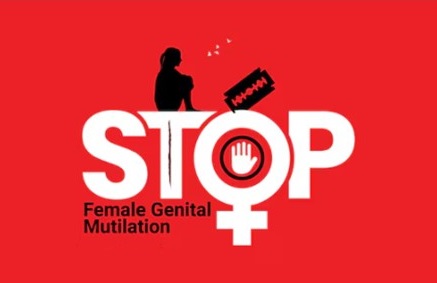Global, National and Community Efforts to End Female Genital Mutilation
By: Foluke Akinwalere. Freelance Health Writer. Medical review and editorial support provided by the DLHA Team

Zero tolerance to Female Genital Mutilation. image credit from Freepik
Female Genital Mutilation (FGM) refers to a range of practices that involve the cutting or removal of parts of the female genitalia for non-medical reasons. FGM is classified into four types, (Clitoridectomy, Excision, Infibulation, and other harmful procedures to the female genital). This practice is deeply rooted in the traditions of certain communities, predominantly in Africa, the Middle East, and some parts of Asia, where it is often tied to cultural, religious, or social norms.
The importance of addressing FGM cannot be overstated, as it has profound physical, psychological, and social consequences for women and girls. Physically, FGM can lead to severe complications such as chronic pain, infections, infertility, and complications during childbirth. Psychologically, it can cause lasting trauma, anxiety, and depression. Socially, FGM perpetuates gender inequality, reinforcing harmful stereotypes and controlling women’s bodies.
From a global human rights perspective, FGM is recognised as a violation of the rights of women and girls. It infringes on their right to health, security, and physical integrity, as well as their right to be free from torture and cruel, inhuman, or degrading treatment. It is considered a culturally harmful practice. Addressing FGM is essential to ensuring gender equality, protecting the dignity and autonomy of women and girls, and fulfilling international human rights obligations.
The global efforts to end female genital mutilation is a coordinated initiative involving international organisations, governments, NGOs, and advocacy groups. These efforts aim to eradicate FGM through a combination of policy advocacy, education, legal action, and community engagement.
The United Nations and its agencies, particularly UNICEF and the World Health Organisation (WHO), play a pivotal role in combating FGM worldwide. UNICEF works extensively on the ground in countries where FGM is prevalent, focusing on education, advocacy, and communities-based interventions. [1] WHO, on the other hand, provides critical health guidelines and policies to support medical professionals and governments in preventing and managing the consequences of FGM. WHO also generates evidence to improve the understanding of FGM and what works to end this harmful practice. [2]
A significant initiative in this fight is The Global Strategy to Stop Healthcare Providers from Performing FGM, developed by WHO in collaboration with other UN agencies. This strategy aims to prevent the medicalisation of FGM, which is a growing trend where the practice is performed by healthcare professional, falsely legitimising it as a safe procedure.
Global campaigns such as #EndFGM and the “International Day of Zero Tolerance for FGM” (observed annually on Febrary 6th) have been instrumental in raising awareness, mobilising resources, and encouraging global solidarity. These campaigns use social media, public events, and educational materials to engage a broad audience and promote zero tolerance towards FGM.
International legal frameworks are vital in the global fight against FGM. Treaties and conventions like the “Convention on the Elimination of All Forms of Discrimination Against Women (CEDAW)” and the “United Nation Convention on the Rights of the Child (UNCRC)” provide a legal basis for government to enact and enforce laws against FGM. These treaties obligate signatory countries to take all necessary measures to prevent FGM and protect women and girls from this harmful practice.
International NGOs and advocacy groups, such as Amnesty International, Equality Now, and the Orchid Project, work tirelessly to influence policy, support survivors, and drive change at the grassroot level. The advocate for the enforcement of anti-FGM laws, the provision of support services for survivors, and the promotion of alternative rites of passage.
Successful international interventions serve as powerful case studies in the fight against FGM. For instance, in countries like Kenya, Gambia, and Burkina Faso, sustained efforts involving legal action, education, and community engagement have led to significant reductions in FGM prevalence. These success stories demonstrate that with coordinated global and local efforts, the eradication of FGM is possible.
Related
Social factors shaping African women's health
Gambia upholds ban on FGM, boosts women’s health and rights
Exploring the cultural, social, and religious basis for FGM in Africa
Published: September 19, 2024
© 2024. Datelinehealth Africa Inc. All rights reserved.
Permission is given to copy, use and share content for non-commercial purposes without alteration or modification and subject to source attribution.
DATELINEHEALTH AFRICA INC., is a digital publisher for informational and educational purposes and does not offer personal medical care and advice. If you have a medical problem needing routine or emergency attention, call your doctor or local emergency services immediately, or visit the nearest emergency room or the nearest hospital. You should consult your professional healthcare provider before starting any nutrition, diet, exercise, fitness, medical or wellness program mentioned or referenced in the DatelinehealthAfrica website. Click here for more disclaimer notice.